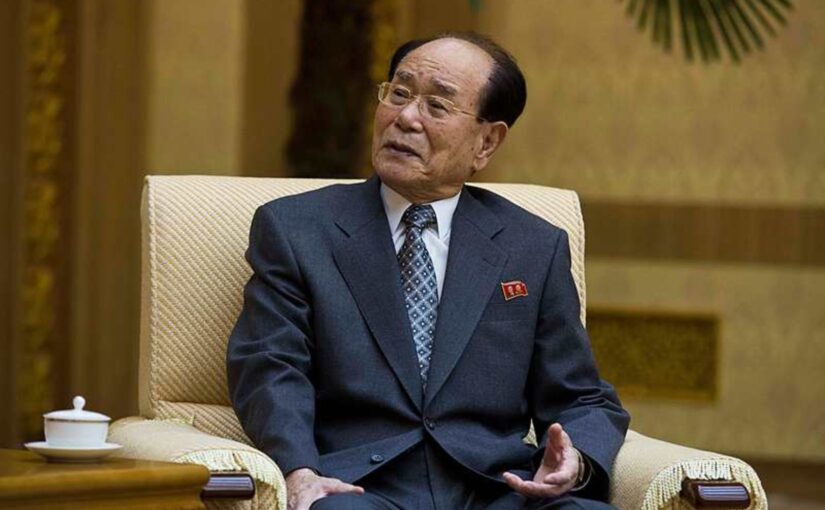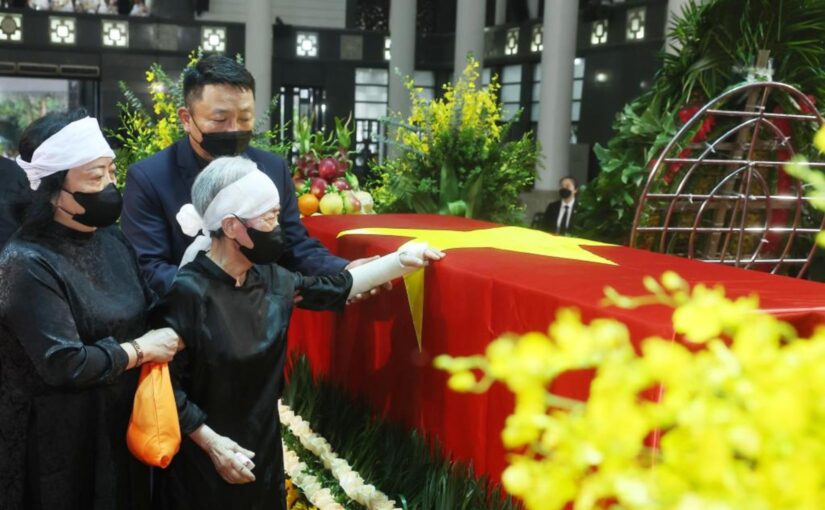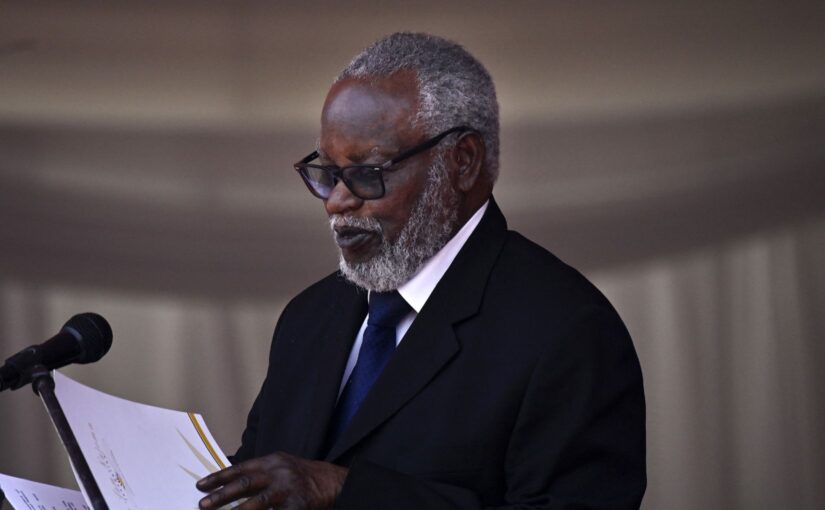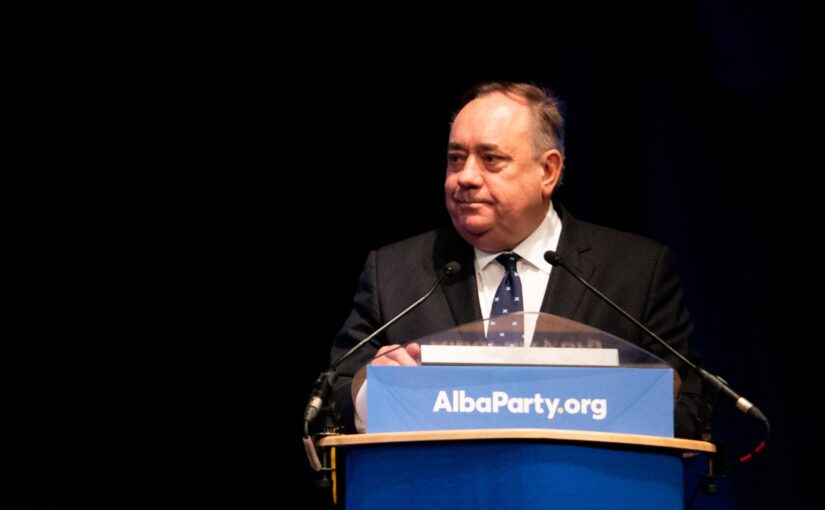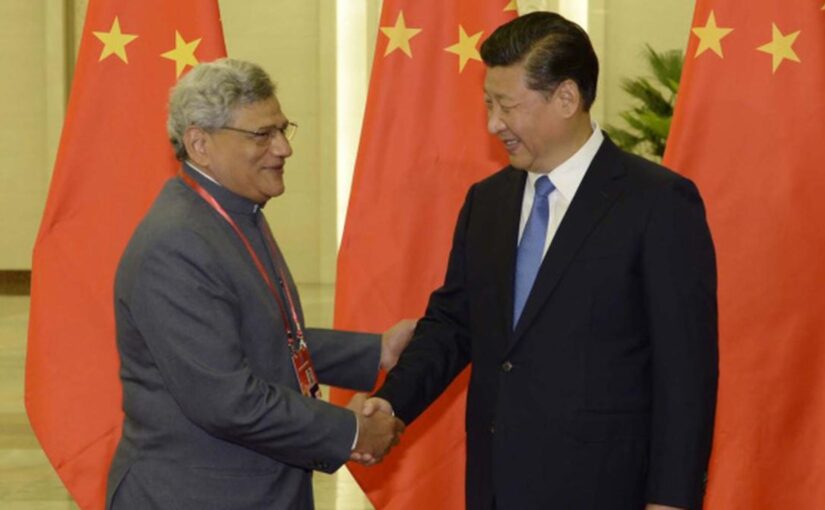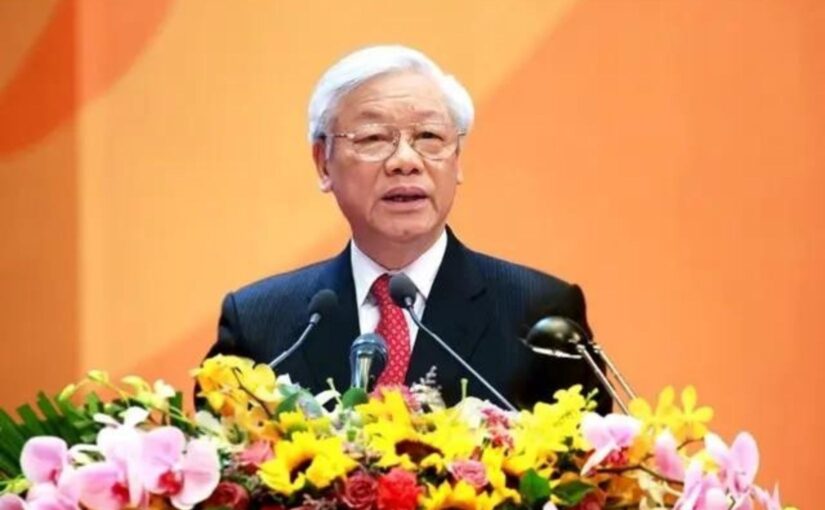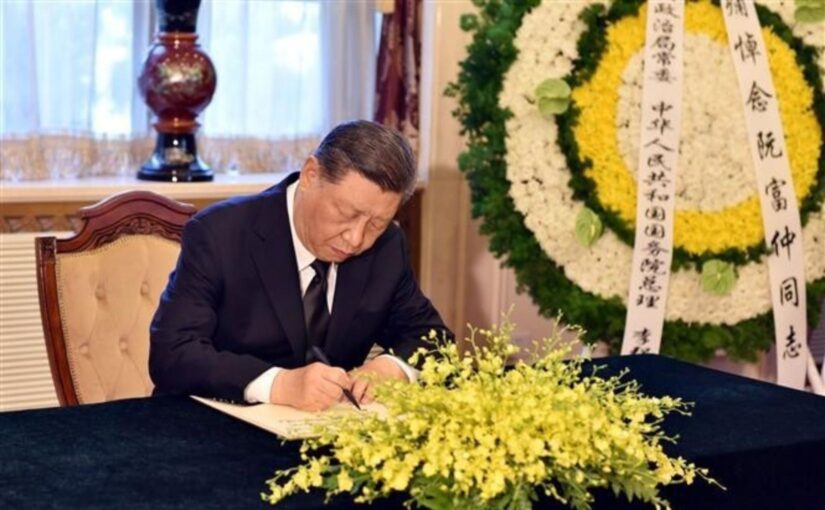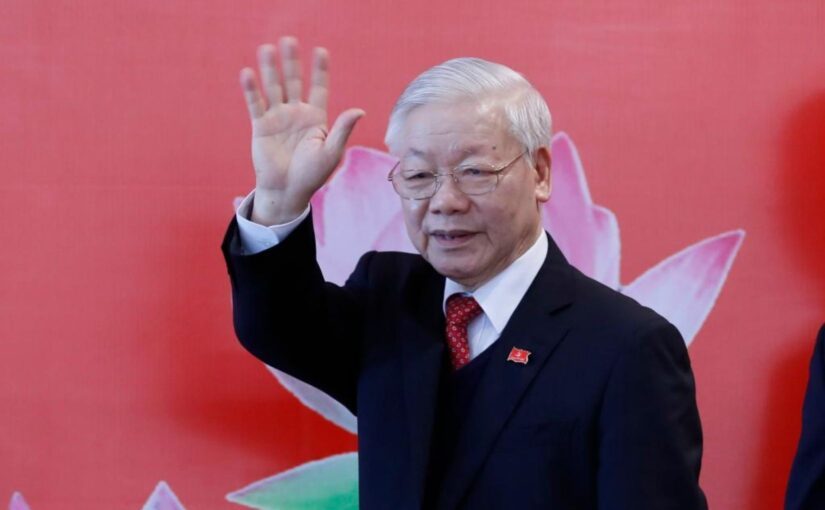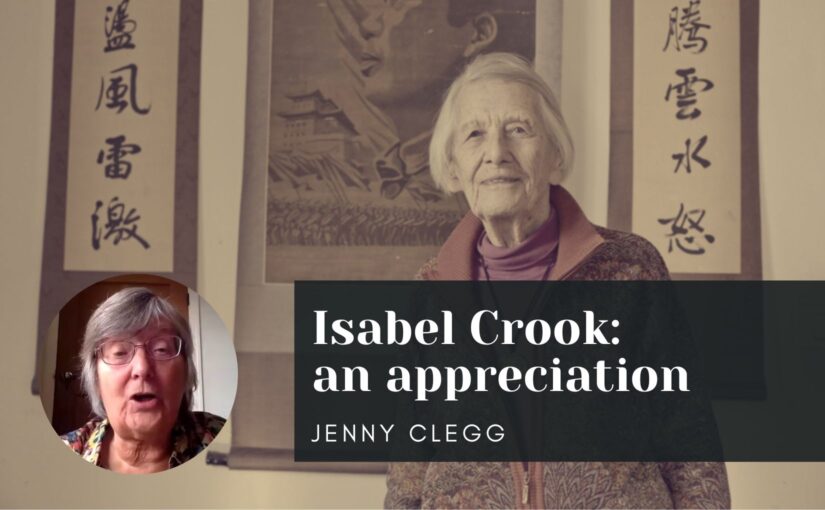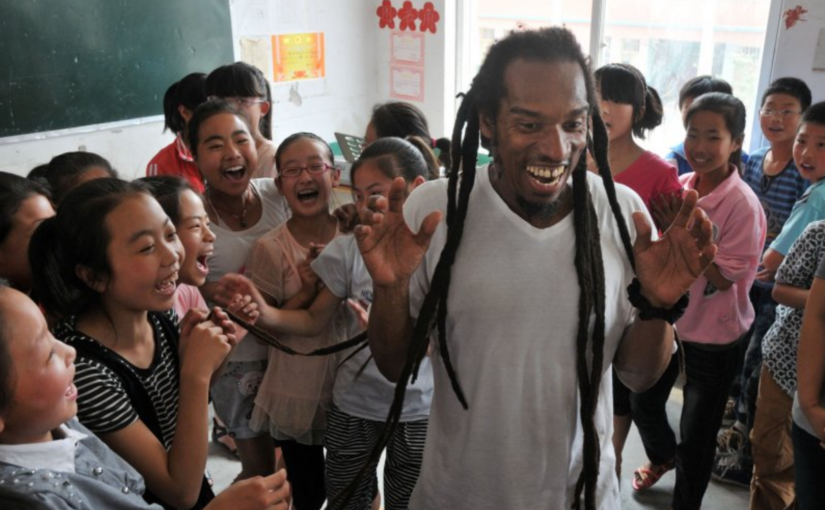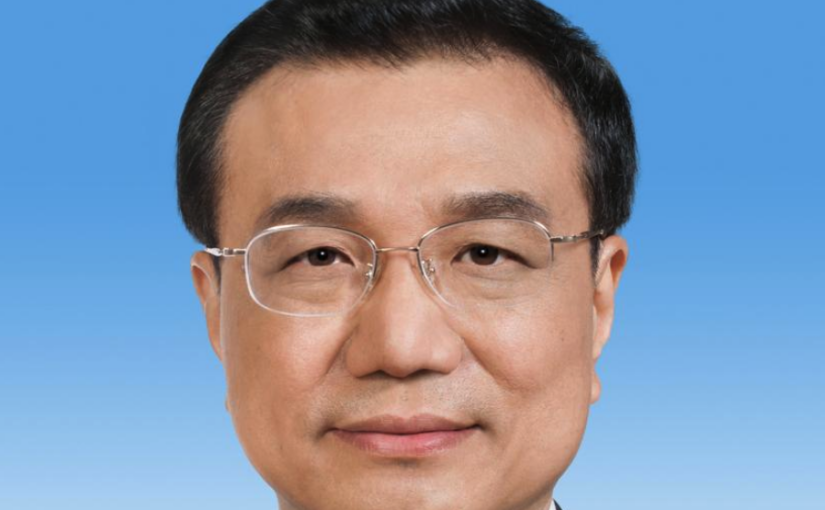Since Nguyen Phu Trong, General Secretary of the Central Committee of the Communist Party of Vietnam (CPV), passed away on July 19, the Vietnamese party newspaper Nhân Dân has carried many articles extolling the late leader’s great contributions to the friendly relationship between Vietnam and China, which has socialism at its core.
On July 20, it carried an interview with Chinese Ambassador to Vietnam Xiong Bo who said: “Party General Secretary Nguyen Phu Trong is a person who persisted in Marxism and a great leader of the Communist Party of Vietnam and the Vietnamese people.”
He added that: “Nguyen Phu Trong attached special importance to the strengthening of the corruption fight and party building and rectification. Especially after the 13th Congress of the Party, the Central Committee of the Communist Party of Vietnam headed by Party General Secretary Nguyen Phu Trong has pushed up the corruption fight with a spirit of ‘no off-limits zones’ and reaped many important results, firmly ensuring the maintenance of social order and security and the following of the way to socialism suitable to the situation in the country.”
He described Trong’s well-known strategy of ‘bamboo diplomacy’ as “underlining that sturdy root means consistently following the CPV leadership and the path to socialism. At the same time, it is necessary to be flexible in terms of strategy on the basis of firmly maintaining independence and self-mastery, and actively developing friendly relations with countries in the world. Under the leadership of the CPV Central Committee headed by General Secretary Nguyen Phu Trong, Vietnamese diplomacy has gained many important achievements as described by the CPV leader that Vietnam ‘has never enjoyed such fortune, power, international standing and prestige as it does today.’”
Moreover, “Party General Secretary Nguyen Phu Trong is a close comrade and a sincere friend of the Communist Party of China and the Chinese people. He was the one who inherited and developed the traditional friendship of ‘comradeship and brotherhood’ between the two parties and countries of China and Vietnam, forming a passionate friendship with the Communist Party of China and Chinese leaders.”
Recalling his personal relationship and friendship with Trong, the Ambassador said:
“The event that left the deepest impression on me took place on August 25 last year. At the invitation of Party General Secretary Nguyen Phu Trong, I accompanied him in the visit to the Huu Nghi International Border Gate in the northern province of Lang Son, which is located at the border between the two countries. Party General Secretary Nguyen Phu Trong repeatedly emphasised that the Vietnam-China Friendship border gate is unique in the world, sending out an important message to the people of both countries and the international community on the traditional friendship between China and Vietnam.
“Together with Party General Secretary Nguyen Phu Trong, I planted the Vietnam-China friendship tree. The party leader affectionately said: ‘This friendship tree has strong roots like the Vietnam-China relationship. With the care of the people of the two countries, this friendship tree will surely grow strong and healthy.’ That Party General Secretary Nguyen Phu Trong himself promoted the traditional relations of friendship between the two countries made me feel extremely touched.”
On July 23, the paper reported Li Minghan, a Hong Kong-based scholar on Vietnam and President Ho Chi Minh, as saying that he is extremely saddened by Trong’s passing. It added that:
“Observing and studying Vietnam’s development for more than a decade, Li realised that General Secretary Trong had good and noble virtues of a leader like President Ho Chi Minh. Vietnam’s achievements have had a profound impact on all socialist countries in the world, especially its anti-corruption results in recent years. General Secretary Trong looked small and simple but he was so strong-willed to order the stringent settlement of corrupt officials strictly, even those holding high positions in the party and state leadership.”
Trong also left an extremely good impression of his integrity and simplicity during his whole life devoted to the party, the nation and the people.
Noting that the General Secretary used only an old car for about 20 years while working in various positions, including three terms as the leader of the Communist Party of Vietnam, Li shared that to effectively fight against corruption and negative phenomena, leaders themselves must set good examples first.
Li, who is 80 years old, said that both he and his wife used to learn Vietnamese at Beijing Foreign Studies University. His father-in-law had the honour to prepare a meal for President Ho Chi Minh when he worked at the Chinese Embassy in Hanoi. That inspired his interest in studying Vietnam in general and President Ho Chi Minh in particular.
Regarding Vietnam-China relations, Li said that one of the bilateral ties’ highlights under Trong’s leadership is an appropriate and effective foreign policy in harmonising Vietnam’s relations with major countries, as well as strengthening and developing connections with socialist countries and communist parties.
The following articles were originally published by Nhân Dân.
Ambassador Xiong Bo: Contributions by Party General Secretary Nguyen Phu Trong to Vietnam – China remain unforgettable
July 20 (Nhân Dân) — General Secretary of the Communist Party of Vietnam Central Committee Nguyen Phu Trong passed away on July 19 afternoon at the age of 80, according to the board of health protection and care for central officials. Chinese Ambassador to Vietnam Xiong Bo expressed his sentiment and ideas on the late leader following the event.
Reporter: In the great loss of the Vietnamese Party, State and people, how do you assess the role and contributions by Party General Secretary Nguyen Phu Trong to the revolutionary cause of Vietnam?
Ambassador Xiong Bo: First of all, I am deeply grieved and would like to express the deepest condolences on the passing away of Party General Secretary Nguyen Phu Trong, the Central Committee of the Communist Party of China immediately sent its message of condolences to the Central Committee of the Communist Party of Vietnam, respectfully commemorating Party General Secretary Nguyen Phu Trong. Party General Secretary Nguyen Phu Trong is a person who persisted Marxism and a great leader of the Communist Party of Vietnam and the Vietnamese people. He was elected as General Secretary of the Central Committee of the Communist Party of Vietnam at the Party’s 11th, 12th, and 13th Congresses, and supported and loved by the Vietnamese people. Over the past more than 10 years, he has led the Party, Government, and people of Vietnam in recording many important development achievements. Party General Nguyen Phu Trong is an outstanding politician who has profound perception on the maintenance of the Party’s leadership and the persistence of the way to socialism, leaving deep imprints on me.
Party General Secretary Nguyen Phu Trong attached special importance to the strengthening of the corruption fight and Party building and rectification, especially after the 13th Congress of the Party, the Central Committee of the Communist Party of Vietnam headed by Party General Secretary Nguyen Phu Trong has pushed up the corruption fight with a spirit of “no off-limits zones” and reaped many important results, firmly ensuring the maintenance of social order and security and the following of the way to socialism suitable to the situation in the country.
Reporter: Over the recent years, Vietnam has pushed up the implementation of the “bamboo diplomacy” featuring strong roots, solid stems, and flexible branches. How do you assess the role of Party General Secretary Nguyen Phu Trong in shaping and developing this diplomatic policy?
Ambassador Xiong Bo: Party General Secretary Nguyen Phu Trong initiated the persistent implementation of the “bamboo diplomacy”, underlining that sturdy root means consistently following the CPV leadership and the path to socialism. At the same time, it is necessary to be flexible in terms of strategy on the basis of firmly maintaining independence and self-mastery, and actively developing friendly relations with countries in the world. Under the leadership of the CPV Central Committee headed by General Secretary Nguyen Phu Trong, Vietnamese diplomacy has gained many important achievements as described by the CPV leader that Vietnam “has never enjoyed such fortune, power, international standing and prestige as it does today.”
We found that Vietnam’s diplomacy underscores the priority to developing relations with neighbours and world powers as well as partners sharing traditional friendship. At the same time, Vietnam has persistently supported true multilateralism, attached importance to the protection of international equality and justice, and opposed the interference in internal affairs of other states. China highly evaluates this.
Reporter: What are your comments on the imprints that Party General Secretary Nguyen Phu Trong has left in the Vietnam-China overall relations? During the Vietnam visit by General Secretary of the Communist Party of China and Chinese President Xi Jinping in late 2023, the two sides established a “new positioning” for bilateral relations, elevating the comprehensive strategic cooperative partnership, and building a Vietnam-China community with a shared future that carries strategic significance. How do you assess Party General Secretary Nguyen Phu Trong’s contributions to this event?
Ambassador Xiong Bo: Party General Secretary Nguyen Phu Trong is a close comrade and a sincere friend of the Communist Party of China and the Chinese people. He was the one who inherited and developed the traditional friendship of “comradeship and brotherhood” between the two Parties and countries of China and Vietnam, forming a passionate friendship with the Communist Party of China and Chinese leaders. Since taking office as the General Secretary of the CPV, comrade Nguyen Phu Trong had made considerable contributions to promoting the development of relations between the two Parties and the two countries, especially through the exchange of three historic visits with General Secretary Xi Jinping, during which they oriented the development of relations between the two Parties and countries of China and Vietnam in the new era together.
In the past two years, Party General Secretary Nguyen Phu Trong visited China right after the 20th National Congress of the Communist Party of China, and warmly welcomed General Secretary Xi Jinping last year. The two leaders announced the building of a Vietnam-China community with a shared future that carries strategic significance, defining a new positioning of the ties between the two countries in the new era, elevating the relations between the two Parties and countries to a new historical height. We recognise, highly appreciate and will never forget this.
Reporter: Could share your impressions on Party General Secretary Nguyen Phu Trong? What is the deepest impression the Party General Secretary has left on you?
Ambassador Xiong Bo: I have been the Chinese Ambassador to Vietnam for more than five years, and my work has received great assistance and help from Party General Secretary Nguyen Phu Trong. After taking office in 2018, I was very honoured to present my credentials to General Secretary and President Nguyen Phu Trong. This was the first time the Party leader received a foreign ambassador presenting credentials after he had assumed the position of the State President. Since then, I have met with the Party leader many times and had opportunities to listen to his important and profound ideas on developing the relationship between the Parties and countries of Vietnam and China, which has left deep impression on me.
The event that left the deepest impression on me took place on August 25 last year. At the invitation of Party General Secretary Nguyen Phu Trong, I accompanied him in the visit to the Huu Nghi International Border Gate in the northern province of Lang Son, which is located at the border between the two countries. Party General Secretary Nguyen Phu Trong repeatedly emphasised that the Vietnam – China Friendship border gate is unique in the world, sending out an important message to the people of both countries and the international community on the traditional friendship between China and Vietnam. Together with Party General Secretary Nguyen Phu Trong, I planted the Vietnam – China friendship tree. The Party leader affectionately said: “This friendship tree has strong roots like the Vietnam-China relationship. With the care of the people of the two countries, this friendship tree will surely grow strong and healthy.” That Party General Secretary Nguyen Phu Trong himself promoted the traditional relations of friendship between the two countries made me feel extremely touched.
Thank you for your conversation!
Vietnamese Party chief makes life-long dedication to nation: Chinese scholars
23 July (Nhân Dân) — The passing of Party General Secretary Nguyen Phu Trong is a huge loss to not only the Party, State and people of Vietnam but also international friends, including Chinese scholars who have spent years studying Vietnam.
Li Minghan, a Hong Kong-based scholar on Vietnam and President Ho Chi Minh, said that he is extremely saddened by the passing of the communist, who is one of respectable Vietnamese leaders.
Observing and studying Vietnam’s development for more than a decade, Li realised that General Secretary Trong had good and noble virtues of a leader like President Ho Chi Minh. Under his leadership, the country has achieved outstanding progress in politics, economy, defence and security, and secured increasing prosperity and happiness for its people.
Li said that Vietnam’s achievements have had a profound impact on all socialist countries in the world, especially its anti-corruption results in recent years. General Secretary Trong looked small and simple but he was so strong-willed to order the stringent settlement of corrupt officials strictly, even those holding high positions in the Party and State leadership.
The leader also left extremely good impression of his integrity and simplicity during his whole life devoted to the Party, the nation and the people.
Noting the General Secretary used only an old car for about 20 years working in various positions, including three terms as the leader of the Communist Party of Vietnam, Li shared that to effectively fight against corruption and negative phenomena, leaders themselves must set good examples first.
Li, who is 80 years old, said that both he and his wife used to learn Vietnamese at Beijing Foreign Studies University. His father-in-law had the honour to prepare a meal for President Ho Chi Minh when he worked at the Chinese Embassy in Hanoi. That inspired his interest in studying Vietnam in general and President Ho Chi Minh in particular.
The scholar found that General Secretary Trong learned and applied much of the style, virtues and ethics of President Ho Chi Minh, especially the loyalty and dedication to the Party, the State and the people of Vietnam.
Mourning the Vietnamese Party chief, Li was so moved that he made a poem to share with his Vietnamese friends and people in Hong Kong. He held that the General Secretary deserves to be one of President Ho Chi Minh’s excellent disciples.
Regarding Vietnam-China relations, Li said that one of the bilateral ties’ highlights under Trong’s leadership is an appropriate and effective foreign policy in harmonising Vietnam’s relations with major countries, as well as strengthening and developing connections with socialist countries and communist parties. Vietnam has not only stabilised relations with the US and Russia, but also promoted relations with China to a new level.
Meanwhile, Wang Feng who is a former reporter of the Xinhua News Agency, said that she felt down to hear about Trong’s passing. The leader dedicated his entire life to the development of Vietnam as well as the friendship in all fields between the two countries.
Wang shared that she met Trong once and felt that he was very friendly, smart and flexible. There are not many leaders like him.
Researching many works by the General Secretary, she perceived that Trong was a person with a deep theoretical foundation, in terms of both politics and economics. He applied Marxism-Leninism into practice, made great contributions to anti-corruption efforts and economic and cultural development in Vietnam, and promoted the two countries’ exchanges and cooperation.
Under Trong’s leadership, the China – Vietnam relationship has achieved many highly positive results in various fields, especially people-to-people exchanges, Wang added.
